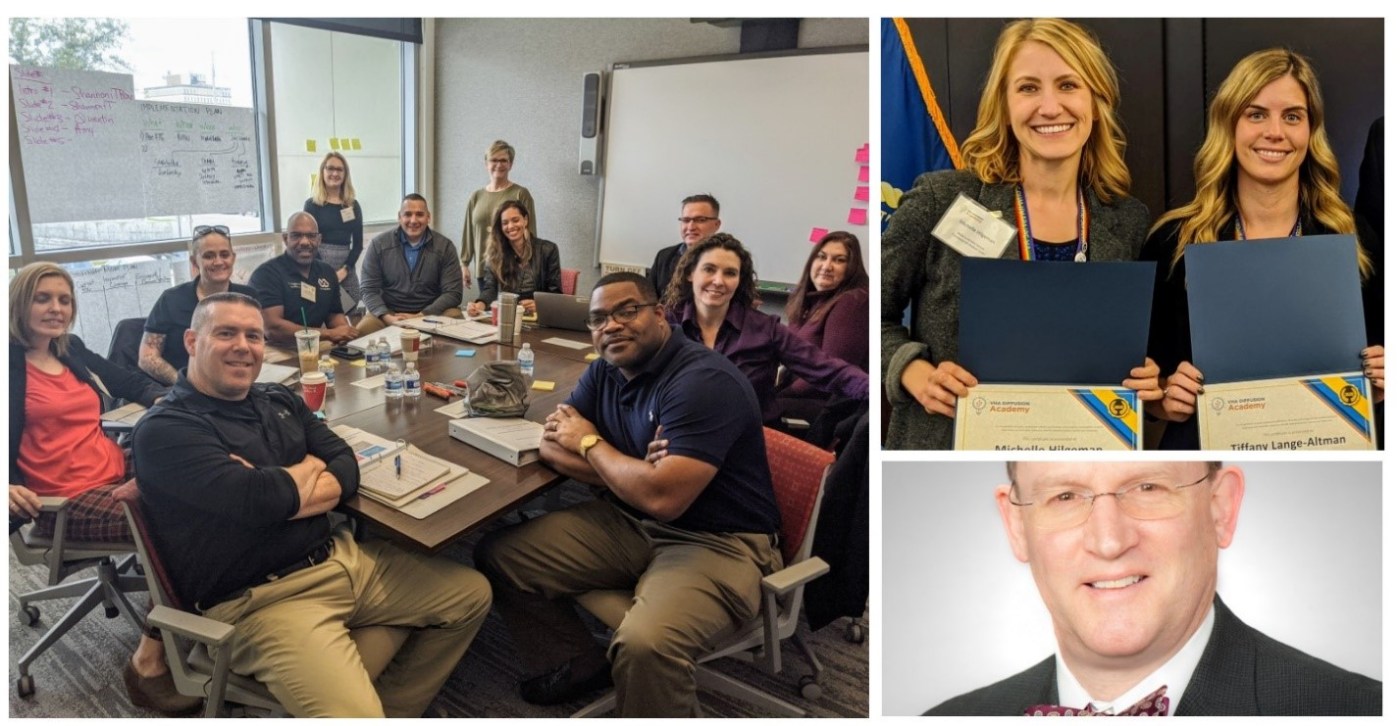Systematically changing how health care works is no easy feat – but at VA, the Veterans Health Administration Innovation Ecosystem’s (VHA IE’s) Diffusion of Excellence (Diffusion) is doing just that. By finding, supporting, spreading and adapting practices at VA, Diffusion is bringing the best care and practices to more and more Veterans. Now three more practices, supported and spread by Diffusion, are making the leap from limited rollouts to national efforts, changing and saving Veteran lives across the country.
These three practices have been adapted and modified to be easily implementable at any VA facility through Diffusion of Excellence. The teams behind them, starting at their own facility and expanding to others, have developed resources, methods and plans that allow their work to be used by VA across the country, establishing new health care norms that give Veterans the best care and support anywhere.
PRIDE
LGBT Veterans are at an increased risk for suicide and other health care disparities, due in part to discrimination and barriers to accessing care. Despite VA having provider-focused education and inclusive policies, a gap in clinical services for LGBT Veterans remained. PRIDE was created to address this gap, delivering guidance and support to LGBT Veterans for tools and training to VA employees. PRIDE is a 10-week health education group where group facilitators follow a session-by-session manual with corresponding Veteran handouts on each topic including information about how to access relevant services within VHA.
The practice began at Hampton VA Medical Center and spread through support from Tuscaloosa VAMC and the Innovators Network. It has now been implemented in 27 facilities across the country. The more than 275 Veterans who have taken part in the program have reported a reduced likelihood of attempting suicide in the future, reduced anxiety and concern about not being accepted, and an increased feeling of community and inclusiveness. Now, through Diffusion of Excellence, the practice will begin spreading even further, vitalizing VA’s LGBT community and affecting even more Veteran lives.
Preoperative Screening and Risk Analysis Index
Frail Veteran patients suffer disproportionately high rates of adverse complications after surgery, including death. Among the frail, even low-stress surgeries result in mortality rates significantly higher than 1%. And when the patient is very frail, as many as one in three die within six months of surgery. The Preoperative Screening and Risk Analysis Index (RAI), originating at the Omaha VAMC in 2012, addresses this issue by mandating a Risk Analysis Index for all Veterans heading for surgery. Based on this review, clinicians from surgery, anesthesia, critical care and palliative care were notified of the patient’s frailty and associated surgical risks. If indicated, plans were modified so that safer surgeries would occur.
The outcomes of the work were impressive. RAI assessment equips patients and surgeons with reliable data that informs surgical decision-making, optimizes perioperative care, and reduces the need for long-term services and support following surgery. This led to the 180-day post-operative mortality rate among the frail, falling from 23.9% to 7.7%, with a 20% reduction of per-case costs. Over the next two to three years, RAI will diffuse nationally by engaging with sites all over VHA and sharing the practice’s National Implementation Guide. It will also build frameworks for RAI at both the Veterans Integrated Service Networks (VISN), facility levels, and teaching sites how to use these straightforward tools to generate positive outcomes.
Veterans Mental Evaluation Team (VMET)
One of VA’s leading priorities is reducing Veteran suicide to zero, and VMET is tackling this challenge by partnering with local law enforcement to make sure suicidal Veterans receive increased support at their most vulnerable. When a law enforcement officer in a city where VMET is established encounters a Veteran in crisis, they call the local VA Police Department, who dispatches the VMET team to serve as co-responders with local law enforcement. The team has found that having a Veteran on-hand to assist a Veteran in crisis can make all the difference.
With 1,467 calls to VMET for service and 74 assists to outside agencies since the beginning of last year, the program has saved 27 Veterans at imminent risk of death – and that is only from the VA Long Beach Healthcare System where VMET was first created. By expanding this practice through Diffusion of Excellence, VA will begin to save exponentially more Veteran lives through partnerships with local agencies and Veteran-to-Veteran connections.
Allison Amrhein is the director of operations for the VHA Innovators Network and communications lead for the VHA Innovation Ecosystem.
Topics in this story
More Stories
The Medical Foster Home program offers Veterans an alternative to nursing homes.
Watch the Under Secretary for Health and a panel of experts discuss VA Health Connect tele-emergency care.
The 2024 National Veteran Suicide Prevention Annual Report provides the foundation for VA’s suicide prevention programs and initiatives.







Excellent material. I am a caregiver and there are some LGBT persons who have been made to feel excluded, I would like to be trained to incorporate inclusive support for all persons.